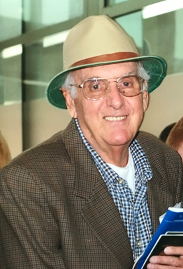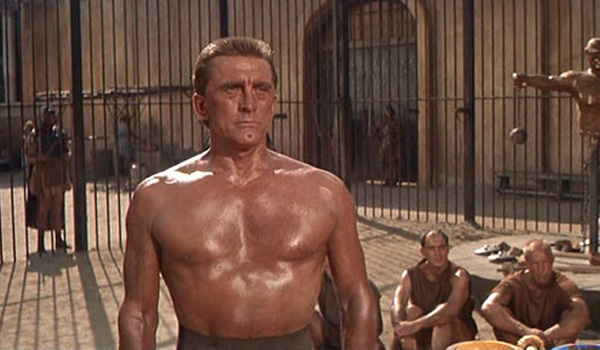By Dr. Johan Tredoux – Uncommon Community
Last night my daughter shared with everyone that she is going to have a baby boy… she is 15 weeks along. She had her daughter, Sylvia, (3.5 yrs old) make the announcement… “I’m going to have a baby brother!” We had great family time together, sharing food laughter and fun. It made me think of my  Dad. In this picture, he has a safari hat on, passport in hand, always ready for the next adventure. He loved rugby, traveling, eating freshly grilled fish on the beach and theology. My dad had big hands and when he saw you, he would always give you a big bear hug and kiss you twice. For me, it is a picture of God’s divine embrace. This week a cute story was circled by my family in South Africa… It’s about the day my dad met Kirk Douglas. As the story goes, my dad was late to go and watch a Rugby game and the only place he could find to sit was on the inside ring of the field. He sat next to 2 guys, one a Namibian and the other an American. The American loved my dad’s enthusiasm cheering for his team and soon he joined my dad in jumping up and shouting for his team, even hugging when they scored. My dad explained to him the rules of rugby and they had a good time together. When the game finished and my dad said goodbye, the Namibian said to dad, ‘Don’t you know who this is?’ My dad looked at Kirk and said ‘You look familiar…’ The Namibian told dad that the American is the movie star Kirk Douglas and that he regularly visits Namibia to hunt and wanted to see a rugby match. It was the 4th of July 1986 and when my dad told the American missionaries at an Independence Day party that evening, no one wanted to believe him…but it really happened!
Dad. In this picture, he has a safari hat on, passport in hand, always ready for the next adventure. He loved rugby, traveling, eating freshly grilled fish on the beach and theology. My dad had big hands and when he saw you, he would always give you a big bear hug and kiss you twice. For me, it is a picture of God’s divine embrace. This week a cute story was circled by my family in South Africa… It’s about the day my dad met Kirk Douglas. As the story goes, my dad was late to go and watch a Rugby game and the only place he could find to sit was on the inside ring of the field. He sat next to 2 guys, one a Namibian and the other an American. The American loved my dad’s enthusiasm cheering for his team and soon he joined my dad in jumping up and shouting for his team, even hugging when they scored. My dad explained to him the rules of rugby and they had a good time together. When the game finished and my dad said goodbye, the Namibian said to dad, ‘Don’t you know who this is?’ My dad looked at Kirk and said ‘You look familiar…’ The Namibian told dad that the American is the movie star Kirk Douglas and that he regularly visits Namibia to hunt and wanted to see a rugby match. It was the 4th of July 1986 and when my dad told the American missionaries at an Independence Day party that evening, no one wanted to believe him…but it really happened!
I think my Dad would have liked Irenaeus. Irenaeus was almost like the Spartacus character that Kirk Douglas played as he took on the Romans. In Irenaeus’ second century world, the fight was with the Gnostics. The Gnostics viewed all matter as evil, but Irenaeus was fighting to emphasize the goodness of creation. This he did by showing that God forms humans with his two hands, which to Irenaeus represents the Son and the Spirit. He said, “And therefore throughout all time, man, having been molded at the beginning by the hands of God, that is, of the Son and of the Spirit, is made after the image and likeness of God.”[1] The phrase “two hands of God” not only speaks of God’s direct involvement in the creation of humanity but also gives us a beautiful picture of his divine embrace. Irenaeus directly connected one hand with image and the other with likeness. This divine embrace posture pictured by Irenaeus as the “two hands of God,” becomes base camp for me when I reference the most original story about me. It anchors me in Genesis 1. I was created in God’s embrace just like my dad embraced me as a baby and embraced me throughout my life.
Irenaeus also took the position that Adam was not created perfect but, rather, created as an infant in the image of God with the intent to come to be in the likeness of God at the end of a process of development. The point is not physical, but moral, childhood. Adam is described as “a little one,” “a child” who had “his discretion still undeveloped.” So, even though Adam (for me archetypical) was created in the beginning in the image of God, Irenaeus anticipated Adam (humanity) to grow towards the likeness of God. For Irenaeus, human beings are free to do good or evil, to believe or not, and even to accept or to refuse that gift of the Holy Spirit which is the likeness (homoiōsis), which alone is able to make [the human person] pursue conduct pleasing to God. But with freedom also comes moral responsibility. This is the case Irenaeus made. Adam was weak, incomplete, a moral infant, but even though he screwed up, he remained in the hands of God. It is because of this view that Irenaeus believed that God had a therapeutic rather than a judiciary relationship with human beings.
Irenaeus helps me to understand that the very essence of who I am is anchored in God’s embrace. And I believe I am to live “from” this position. In a sense, it is to accept my acceptance. It is the “courage to be,” as I am able to absorb the anxiety of non-being into my being, in spite of guilt and feelings of condemnation, because of my belief in God’s forgiveness and his embrace (Paul Tillich in The Courage To Be). I can try to remove myself from the hands of God and go off into the far country (as in the parable of the prodigal son), but God will always be looking for me to come home. I know in God’s heart his love for me never changed. It would be as if I have never left.
Of course, as all of us have done, I have in my own time and in my own way thought that I have removed myself from the hands of God. I embarked upon a journey to express myself, find myself, think and feel good things and bad things about God, many times thinking and feeling I need to get back in God’s embrace. Sometimes it was my religious system that sends me off into the far country. I was told to pray a prayer “to accept Jesus as my personal Savior” in order to get back into the hands of God. The story I was told was that I was born a problem for God, that I was born in sin and these behaviors reinforced that. (Augustine’s view of concupiscence). I was told that I was born already removed from the two hands of God and that somebody did it as my representative (Adam). Early on, theologically, I was placed in a courtroom of guilt and judgment. I was told God can’t look at sin, he is too holy for that. I was encouraged to separate myself from a sinful world so as to not get contaminated.
All along, I was just human… that’s the way God created me. All along God loves to hang out with broken people. All along my religious system growing up made the older brother in the prodigal son story the main character. The story of the running, hugging, kissing father was more of a backdrop in the main tenets of my faith journey. I now realize that the story I was told was anchored in Genesis 3 and propagated by the likes of Augustine. Somehow his belief that sin is inherited from Adam became the main story. Much of this anchored in a miss interpretation of Romans 5. In Paul’s Letter to the Romans he says, “Therefore, as sin came into the world through one man and death through sin, and so death spread to all men because all men sinned.” Augustine translated this last phrase: “in whom all men sinned,” thus tying us with Adam. In my childhood faith even Romans 3:23 was made to fit this story. In Romans 3:23 Paul says that in sinning men have fallen short. He does not say, having fallen short, men sin. It is then important for me to distinguish between fallenness and the moral category of sinfulness. I do not want the fallibility of the human race to be confused with sin. For this reason, I believe it is critical that one maintains a strong distinction between that which is moral and that which is amoral.
Like Irenaeus, I want to base my anthropology on creation, since in my view, humans did not lose their ability to cooperate with God after the fall. As I conclude my reflection, for now, I circle back to the story of my dad and Kirk Douglas. I think this story of my dad hanging out with Kirk, without knowing that he did, is like me hanging out with God without knowing who he really was.
[1] Philip Schaff, Ante-Nicene Fathers (Online: Christian Classics Ethereal Library), I:28, 557.

